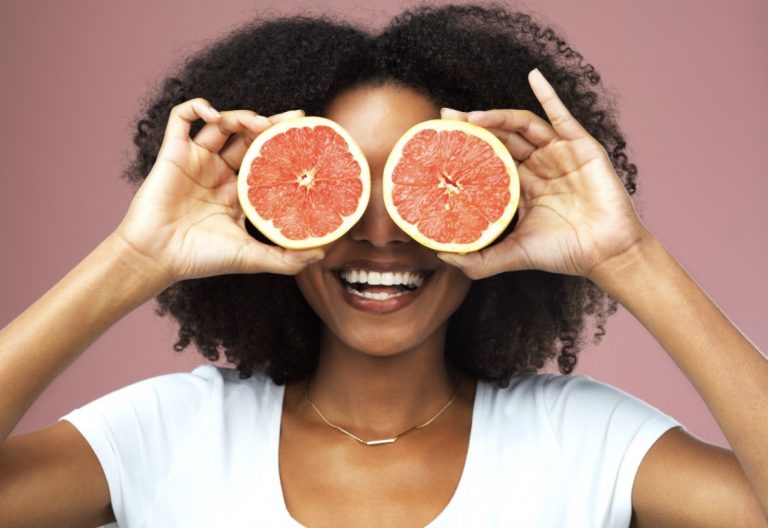Your skin is affected by a variety of influences, such as the weather, how much sleep you get, stress, and more. In this article, we’re putting the focus on how your eating habits can affect your skin and help to give you an idea of what type of foods you could incorporate into your routine to help give your skin (and general health) a boost. We also take a look at using the all-natural compound CBD as part of your skincare routine. After all, your skin is considered the largest and one of the most important organs in your body, and you should take the very best care of it that you can!
Story Stages
Blemishes
Blemishes and spots can occur for a wide range of reasons, such as hormonal changes, environmental factors, your skincare routine and also your diet. It’s been reported that a diet of highly processed foods can cause mild inflammation and aggravate skin issues. Eating a balanced diet that includes vital nutrients and vitamins could help to give your skin its best chance. It’s a good idea to consume vitamins A and E, as studies have found that lower levels of these two vitamins have been associated with blemishes and acne. Some examples of food high in these vitamins include almonds, kiwis, mango, red pepper, salmon, blue cheese and trout.
Moisture
Keeping hydrated is one of the healthiest things that you can do for your skin. It helps to maintain the health of your body as a whole, as it ensures that you expel waste, maintain your concentration levels throughout the day and replace any lost moisture. Skin wise, it helps to keep your skin moisturised, help to maintain a glow and possibly help to minimise wrinkles as it prevents skin sagging by maintaining the elasticity of your skin.
Men should try and drink 3.7 litres of water per day, and women should try and drink 2.7 litres per day. This is an individual process as well, as some people will need more fluids than others due to their weight, height and how much they need to replace from exercise. Fluids count as juice, tea, coffee, herbal drinks and more.
It’s a good idea to put the focus onto the water in comparison to drinks that contain caffeine, as these can be dehydrating. If you struggle to drink water, why not try adding lemon or lime to help flavour it? Or you could try a herbal tea that you’ve never tried before.
Wrinkles
The food that you eat can also have an impact on your skin health, including premature ageing and wrinkles. You can boost the collagen production in your skin through your diet, which will help to give it an overall smoother appearance. Increasing omega-3 and omega-6 fatty acids and healthy oils in your diet (and healthy proteins) can help to keep your skin looking younger. Some good examples of food include tofu, sunflower seeds, eggs, avocado oil, peanut butter and hemp seeds.
Skincare Tips
So, other than consuming a healthy diet, what other skincare tips can you follow?
- Sleep: Getting enough sleep can greatly influence the health of your skin. One study published in 2017 reported that two days of sleep deprivation affected the participants’ perceived health and attractiveness. There are simple rituals that you can do to help improve your sleep, such as avoiding caffeine late in the afternoon, opting to read a book rather than watch TV, drinking calming drinks, avoiding blue light and investing in a comfortable mattress.
- Skincare: Establishing a daily skincare routine is a great idea, as it can help to maintain the appearance of your skin. It can also help to prevent blemishes and infections, as you’re washing away the impurities or bacteria that has built up from the day. It’s also a great idea to moisturise your skin and apply sunscreen before you leave the house to protect your skin from UV damage.
- Try CBD: Adding a natural supplement to your routine may help to support your overall well-being, your skin included! CBD (the short name for cannabidiol) is one of many other beneficial cannabinoids found in the cannabis plant. The plant consists of other cannabinoids, flavonoids, vitamins and terpenes. Unlike tetrahydrocannabinol (THC) which is another cannabinoid, CBD isn’t intoxicating. This means that you won’t feel ‘high’ if you consume a CBD product, as there can only be a maximum amount of 0.2% of THC. You can purchase CBD in many forms; however, there’s a wide range of topical products to choose from that you apply directly to your skin. This means that the CBD is absorbed into your skin rather than your bloodstream, which is how many other products get absorbed. So, why choose CBD for skin? CBD may help to soothe your skin, especially if it’s included in a cream or a lotion. It can also help to provide relief for your skin if you need it, although don’t apply it to any broken patches of skin. You can also add CBD to your diet, although it won’t provide you with targeted action for your skin. For example, you can add a couple of drops of CBD oil to your food or drink, you can purchase the best CBD gummies, tasty dried fruits, infused protein bars and more.
Final Thoughts
So, there we have it – how your diet can affect the health of your skin! Your diet is so crucial for your overall health, as eating a balanced diet can help to maintain your overall health and well-being. Alongside eating vitamin-rich foods and drinking plenty of water, getting enough sleep, natural supplements and practising good skincare habits can also help to contribute to beautiful skin. Finally, it’s important to note that if you have any worries concerning the health of your skin, then it’s a great idea to make an appointment with a dermatologist or medical professional.
